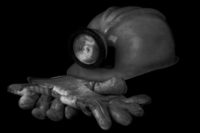I also am a coal miner and have worked in the mines for 34 years. I worked in union mines for 23 years and have worked in non-union mines the rest of the time. Other than working for 2 years in a saw mill, I have worked my entire adult life in the coal mining business. I have experience in all aspects of coal mining, including being a roof bolter, a long wall operator, and driving a shuttle car.
My son and I actually worked together at several mines. I am presently employed by Massey at the Parker Peerless mine, but I am off work because of the trauma I’ve suffered as a result of losing my son.
Safety inspections were much different in the union mines I’ve worked at versus the nonunion Massey mines. When an MSHA inspector comes onto a Massey mine property, the code words go out “we’ve got a man on the property.” Those words are radioed from the guard gates and relayed to all working operations in the mine. The mine superintendent and foreman communicate regularly by phone, and there are signals that require the foreman who is underground to answer the phone. That is one way that the message is conveyed that an inspector is on the property. When the word goes out, all effort is made to correct any deficiencies or direct the inspector’s attention away from any deficiencies.
When I worked at union mines, workers at the mine would accompany the MSHA inspectors during their inspections. I was on a safety committee and the members of the committee took turns going around with the MSHA inspectors and pointing out areas of concern. Moreover, as a union miner I was able to refuse to work in unsafe conditions without fear of retaliation.
When the MSHA inspector comes to a Massey mine, the only people accompanying him are Massey company people. No coal miner at the mine can point out areas of concern to the MSHA inspector. In fact, for a miner working for Massey, the feeling is, if an MSHA inspector fails to say anything about all of these safety problems, what right do I have to say anything about them, and I definitely would be terminated or retaliated against if I said anything. MSHA inspections at Massey did little to protect miners. Employees who work in underground coal need the absolute right to address the MSHA inspector directly and tell him about any areas of concern they have – without fear of retaliation. We absolutely looked to MSHA for leadership, particularly on safety issues, but MSHA has let us down many times.
The MSHA inspectors usually do their inspections during the day shift, but the mines mine coal during many other shifts. MSHA needs to conduct inspections during the evening shifts and Saturdays, in addition to the week day shifts to ensure that they are there whenever coal is being mined. Having them only inspect mines during the day obviously creates an opportunity for the mines to not comply with all safety requirements during the hours that they know the inspectors will not be around. When MSHA is not present, there is no thought of doing anything other than producing coal. The miners are not allowed to hang curtains or conduct any other safety operations if they would interfere with or delay the production of coal. From my experience, I believe the law could be strengthened to help protect the safety of miners in the following ways:
- Have the inspectors conduct inspections during every shift when coal is being produced at the mine, not just during the day shift. • Require inspectors to randomly select different miners to accompany them during their inspections, so that the miners can tell the inspectors about their concerns without fear of retaliation.
- Hold inspectors responsible for the safety of the miners. These men look to federal mine inspectors for leadership.
- Do not allow any prior warning of inspections. When an MSHA inspector comes onto a mine property to conduct an inspection, there should be a severe penalty for alerting anyone of the inspector’s presence, a penalty that discourages anyone from providing such a warning. MSHA inspectors should be able to come unannounced and inspect mines at any time.
The Upper Big Branch mine used to be a very safe mine but something happened. During the last year, I understand that there were serious violations at the mine and many orders written. This mine was clearly not safe and as a result 29 miners died, including my son. He worked for 14 years underground and had been on the long wall for 8 years.
Someone needs to be held responsible for these deaths. And more importantly, we need to change the laws or modify them to make sure this does not happen again. I ask the members of this ommittee to undertake such a commitment to my family and the families of all of us who have lost their loved ones in this explosion to make sure that this never happens again. We’ve had enough tragedy in West Virginia in coal mining. There should be no reason this continues, and I’m asking you to pass laws that ensure that miners do not have to work in an unsafe place, and that they can refuse to work if it is unsafe without the fear of being fired.
Thank you.
